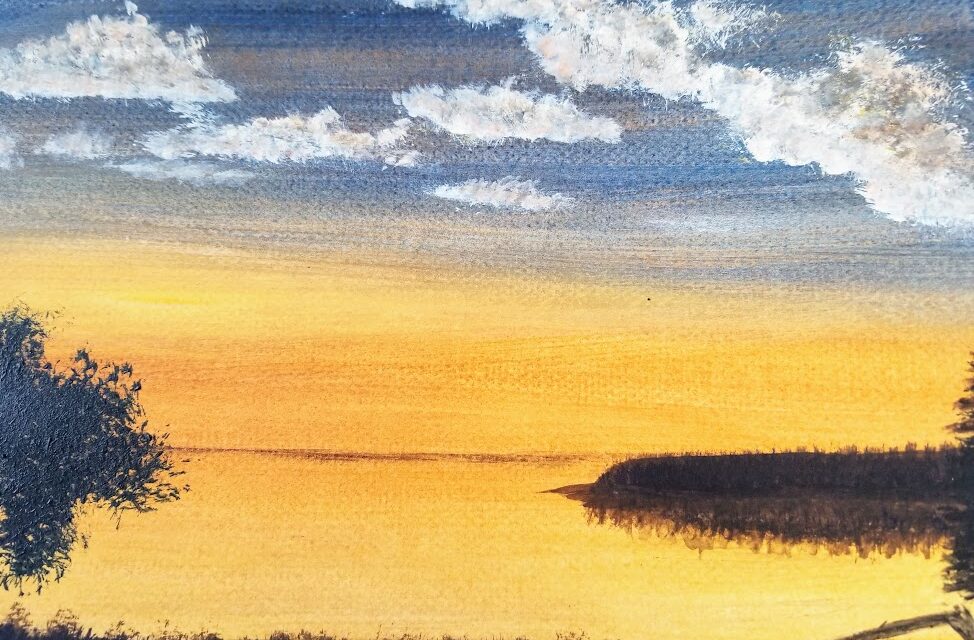Painting by Belynda Wilson Thomas
He who can no longer pause to wonder and stand rapt in awe, is as good as dead; his eyes are closed. Albert Einstein
Awe is all around us if we are open to it. A magnificent sunrise, sunset, or rainbow is awe-inspiring, and we can see the sunrise and sunset every day if we choose. Scientists are studying the power of awe in our lives and research suggests that experiencing awe can make us healthier, happier, humbler, and more connected with other people.
We may think we’d love to experience awe if we could go see the wonders of the world, but we don’t have to go far to find awe if we are looking for it. Engaging with nature, enjoying great music, and art are ways to bring awe into our lives. Awe might be why we find nature restorative.
Research suggests we feel awe when we encounter something bigger than ourselves and going for a walk once a week will help us cultivate a sense of awe. We don’t always notice awe-inspiring moments but if we are looking for them we will find more of them than if we aren’t, at least this is what researchers believe.
We can find awe anywhere but we are told we will find it most often when surrounded by physical vastness and novelty. We don’t have to visit the snowy peaks of Kilimanjaro at sunrise, the Grand Canyon, or Niagara Falls to feel awe; we can take a new path, go to a new park, find a new hiking trail, or look at the sunrise, sunset, and cloud formations from our own home.
See the world through the eyes of your inner child. The eyes that sparkle in awe and amazement as they see love, magic and mystery in the most ordinary things. Henna Sohail
Brief experiences of awe lead people to think about others more. In an eight-week study, people were asked to take three pictures, at the beginning, middle, and end of each walk. The researchers were surprised that people who experienced awe dedicated more space to the background of their photos and also had bigger smiles on their faces.
Dacher Keltner, a psychologist at the University of California, Berkeley, and the author of Awe: The New Science of Everyday Wonder and How It Can Transform Your Life, defines awe as “the feeling of being in the presence of something vast that transcends your current understanding of the world.” According to Dacher Keltner, awe is different from fear or an appreciation of beauty – though both can be present when awe is experienced.
To find awe, Dacher Keltner tells us we must look for “eight wonders of life.” These are nature, music, visual design, and moral beauty (when we witness people helping other people). More profound but less common is when we experience “collective effervescence,” the experience when our team wins, spiritual experiences, and epiphanies (when we learn something unexpected that changes our view). Births and deaths are awe-inspiring, the beginning and ending of life.
Often our encounters with awe are rare but they don’t need to be. If we look for awe we will find it in our everyday goings and comings. If we appreciate the small and the great things in our lives we may find awe in everything we see and touch.
Finding awe may make us more grateful, and being more grateful may help us be awe-struck by what we see. A small goal may be to have one awe-inspiring walk per week, and even if we walk the same path it is never the same because nature is always changing.
Gratitude bestows reverence, allowing us to encounter everyday epiphanies, those transcendent moments of awe that change forever how we experience life and the world. John Milton
If the sight of the blue skies fills you with joy, if a blade of grass springing up in the fields, has the power to move you, if the simple things of Nature have a message that you understand, rejoice, for your soul is alive. Eleonora Duse
The world is full of magical things, patiently waiting for our senses to grow sharper. W.B. Yeats
Thank you for reading this post. Please come back and read some more. Have a blessed day filled with gratitude, joy, and love.

















